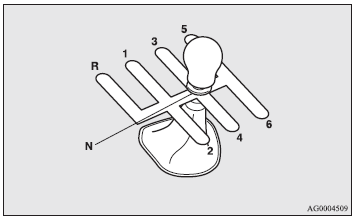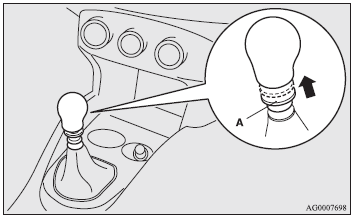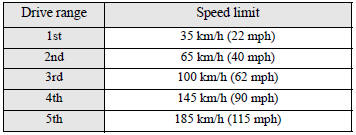Mitsubishi Outlander: Manual transmission

The shift pattern is shown on the gearshift lever knob. Be sure to always fully depress the clutch pedal before attempting to shift the lever.
CAUTION:
● Do not put the gearshift lever into the reverse position while the vehicle is
moving forward. Doing so could damage the transmission.
● Do not rest your foot on the clutch pedal while driving. Doing so could cause
rapid wear to the clutch.
NOTE:
● If it is hard to shift into 1st, depress the clutch pedal again; the shift will
then be easier to make.
● To avoid grinding noises when shifting into reverse, wait approximately 3 seconds
with the clutch depressed when the vehicle is stationary.
Moving the gearshift lever to the “R” (Reverse) position
CAUTION:
● Do not move the gearshift lever to the gRh (Reverse) position while the vehicle
is moving forward; doing so will damage the transmission.

Pull up the pull-ring (A), then move the gearshift lever to the “R” (Reverse) position with the pull-ring still pulled.
CAUTION:
● Do not pull up the pull-ring (A) when moving the gearshift lever to any position
other than the “R” (Reverse) position. If you always pulled up the pullring (A)
when moving the gearshift lever, you could unintentionally move the gearshift lever
to the “R” (Reverse) position and cause an accident and/or a transmission fault.
The pull-ring will return to its original position when you return the gearshift lever to the “N” (Neutral) position.
CAUTION:
● If the pull-ring will not return from the pulled-up position, we recommend you
to have the vehicle inspected.
Possible driving speed
Avoid shifting down at high speed, as this may cause excessive engine speed (the tachometer needle into the red zone) and damage the engine.

Use 6th gear whenever vehicle speed allows, for maximum fuel economy.
See also:
Seats
Seats are a primary part of the Occupant Restraint System
of the vehicle. They need to be used properly for safe
operation of the vehicle.
WARNING:
• Do not allow people to ride in any area of your
vehicle that is not equipped with seats a ...
Fuel Requirements
All engines are designed to meet all emissions
regulations and provide excellent
fuel economy and performance when using
high quality unleaded “regular” gasoline
having an octane rating of 87. The use
of premium gasoline is not recomm ...

 Starting the engine
Starting the engine